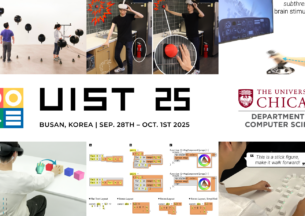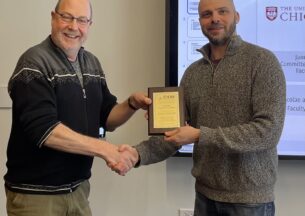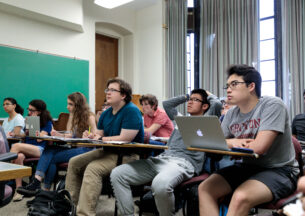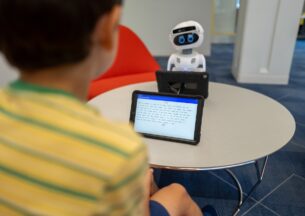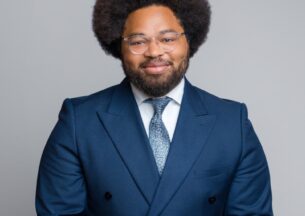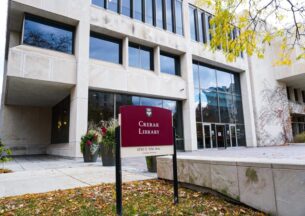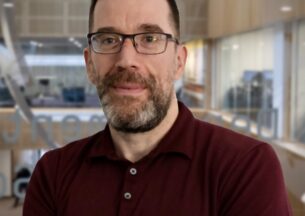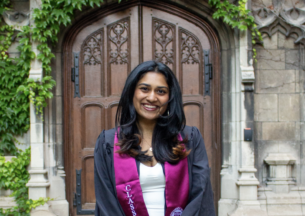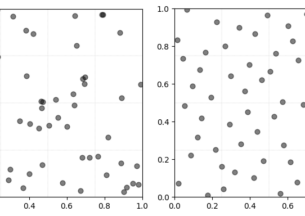Quantum Leap: New Research Reveals Secrets of Random Quantum Circuits
Imagine a world where quantum computing pushes the frontiers of progress, from tackling complex problems that would take classical computers trillions of years, to solving new cryptographic challenges. The University of Chicago’s Department of Computer Science is at the forefront of turning this promise into a reality. A groundbreaking new study that will be presented at this year’s Quantum Information Processing Conference, the most prestigious conference on the theory of quantum computation, delves into the heart of quantum circuits, uncovering secrets about their behavior that could propel us closer to this transformative future.
Cracking the Code of Computation
For decades, classical computers have been the backbone of technological progress. However, classical computers have many well understood limitations. The new frontier? Quantum computing—a paradigm shift in how we process information. Quantum computers harness unique quantum mechanical properties, like the wave-particle duality, quantum interference, and quantum entanglement to achieve exponential advantage in the solving of certain complex problems, marking a new era in computational power.
“Even though the quantum computers that are currently being built have only a modest number of qubits and suffer from the effects of noise, they still exhibit many of these uniquely quantum-mechanical properties, making them very hard to simulate using classical computers,” says Soumik Ghosh, one of the co-authors of this study and a Ph.D. student working with Professor William Fefferman. “One such property is the rapid rate at which quantum circuits scramble information. This is especially true for quantum circuits chosen at random. They take some information and scramble it as fast as any physical process in nature.”
“Indirectly, this is also a test of quantum entanglement,” Soumik added. “More is the scrambling prowess, higher is the entanglement present in the states produced by the circuit, and harder is it to simulate the system classically.”
Essentially, high entanglement means that the quantum state is so complex that any information about the state is “far too scrambled” to decode without looking at all the qubits of the state. That means there are no “shortcuts” to simulating this state, which hinders the power of classical computers.
Scrambling Speed and Random Circuits
The scrambling property of random circuits has been utilized by many groups to demonstrate “quantum supremacy” – performing a task with a quantum computer that is impossible with classical computers. This is the bedrock of Google’s recent quantum supremacy demonstration with their recent Willow chip, which would take a classical computer septillion years to spoof. This has also been the mainstay of other quantum supremacy proposals, like the ones by start-ups like Quantinuum, Xanadu etc, as well as by academic groups like the USTC in China.
Some of these proposals use vastly different architectures – Google’s Willow uses a superconductor-based quantum computer, while Xanadu and USTC use one built using photons. However, the heart of all these proposals is the same – they use the scrambling prowess of a random quantum circuit to beat any existing classical computer in a task.

Because of this, it becomes crucial to understand the minimal circuit depth, or “speed” at which random quantum circuits scramble information. This speed also corresponds to the circuit depth needed for random quantum circuit experiments to be “quantum-supreme” – when scrambling is poor at low depths, a quantum system remains classically simulable, whereas rapid scrambling at higher depths is necessary for quantum supremacy.
In their new work, Fefferman and Ghosh, along with postdoctoral scholar Wei Zhan, pin down the optimal speed. Previously, an upper bound to this speed was known, but it was not known to be tight. The main contribution of this work is to prove a matching lower bound.
Applications of Quantum Supremacy
The University of Chicago’s research on quantum circuits is a crucial step in advancing quantum computing as well as quantum cryptography.
Even though quantum supremacy has been claimed several times, it has been unclear if there is a practical application for these “quantum supreme” experiments. The problems solved so far are contrived and have limited practical considerations. One potential insight may come from the world of quantum cryptography. In recent years there has been a push in the cryptographic community to demonstrate cryptographic applications from the first principles of quantum physics, with the hope that these applications will remain secure even if all of classical cryptography is broken by a very powerful quantum computer.
Fefferman and Ghosh, along with their collaborators, show in their new work, as well as in a very recent follow-up paper, that understanding the scrambling speed of random quantum circuits can be critical to understanding the potential for near-term quantum experiments to solve useful quantum cryptographic applications.
Interestingly, this application to quantum cryptography persists even for near-term quantum experiments that have modest numbers of noisy qubits. Therefore these new works provide a first step towards achieving new quantum cryptographic protocols that are implementable in the near-term.
“We are now entering an exciting new era in which more than a decade of fundamental research on random quantum circuits is being used as a platform to develop new useful and rigorous applications for near-term quantum experiments,” said Fefferman. “We at UChicago are at the forefront of this new research, and I believe our new work on the scrambling speeds of random quantum circuits will be an important step for this era.”



